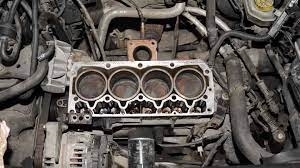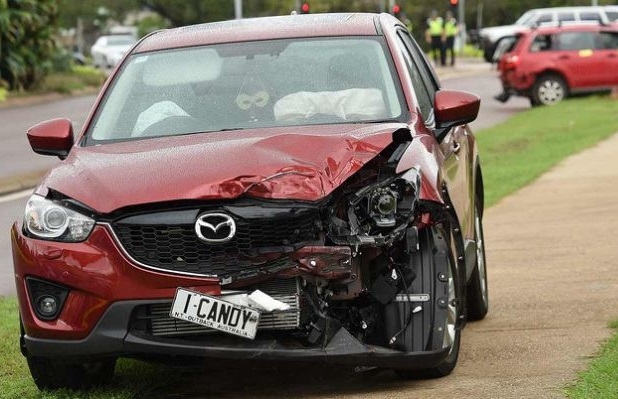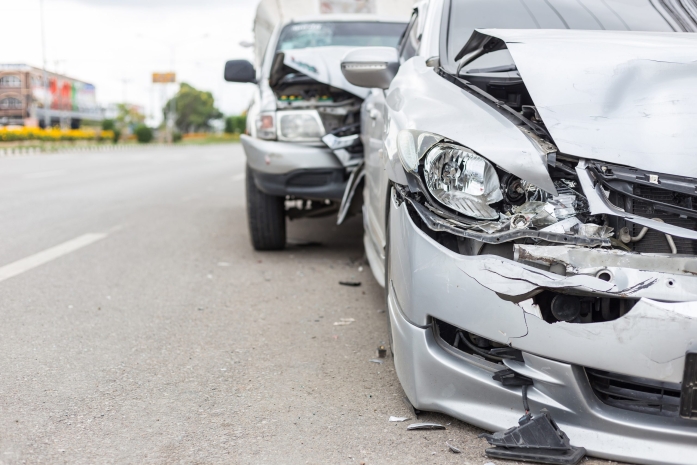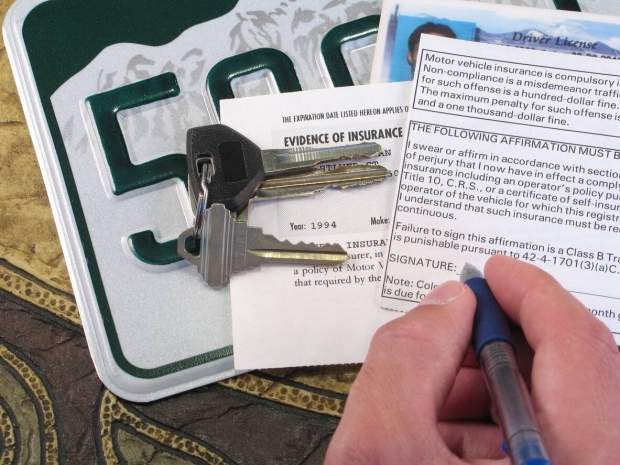A cracked engine block is a major issue for any car! There are serious symptoms to look out for and even more serious repair costs! Read on to see how to spot a cracked engine block, what your options are to fix, or decide to sell it to cut your losses.
5 Cracked Engine Block Symptoms
If you have a cracked engine block, you might not know exactly what’s wrong, but you will definitely be able to tell that something is wrong. Here are 5 cracked engine block symptoms. Many of these symptoms are similar to a blown head gasket, so if you notice any of these, it’s best to get it checked by a mechanic to see if it’s a cracked engine block or head gasket problem.
Smoke coming from the engine
This is very likely to happen because smoking coming from the engine can occur from two different causes. The first cause is that when there’s a crack in the engine, emissions fumes escape through these cracks. That means the emissions won’t travel through the exhaust system and exit through the muffler, and the gasses will escape through the cracks.
Another cause of the smoke is when you have a deep crack in the block, motor oil and antifreeze can mix. When oil gets into the antifreeze, it can burn and create foul smells and smoke. However, this smoke is likely to be coming from the exhaust pipe. This smoke will have a blackish-blueish color, so keep an eye out for that.
Your engine is overheating
When you have a big enough crack, especially in the “right” spot, your coolant and antifreeze mixture will leak out of the block, and the engine will no longer have the capability to cool itself. This is a huge problem because driving with a cracked engine block will cause the overheating to get worse, and it’s likely the overheating will cause the crack to get even bigger. If you see that your engine is overheating, it’s best to get it checked by a trusted mechanic as soon as possible.
Poor engine performance
A cracked engine block means that the seals aren’t effective and will allow some pressure generated in the cylinders to escape. This causes low compression, which means your engine won’t be delivering the regular amount of power to the transmission and the wheels. If you notice a drop in performance from your car (especially with any of these other symptoms), you likely have a cracked engine block. This is actually the most noticeable sign of a cracked engine block, so get your car checked out by a mechanic if you do notice this.
Oil mixed with coolant or antifreeze
This will often cause smoke that we discussed above, but not always. When you do your regular maintenance on your car (like changing the motor oil or coolant), look inside the fluids to make sure they appear as they should. If you change your coolant and see black specks of liquid floating on top, motor oil has likely seeped into your coolant.
Or, if you see a milky white liquid in your motor oil, it’s likely that coolant has leaked into the motor oil. Either way, it’s a sign of a cracked engine block and will need to be examined by a mechanic.
You can see a crack in the block
Well, it’s unlikely that you will see the crack because it’s not that easy. The engine will require some disassembly for you to see the block, which means this will have to be done by a mechanic. If you’ve reached the point of taking it to a mechanic and they disassemble the engine, it’s likely you’re already experiencing some symptoms above. But once it’s taken apart, your mechanic will be able to see a crack in the aluminum engine block visibly.
What Causes an Engine Block to Crack
There are a few reasons why an engine block might crack. Let’s discuss some of these cracked engine blocks causes below.
Faulty casting process during production
This one is pretty unlikely, but it’s still a possibility. This would really only cause a crack in the engine block if it happened with very low mileage on the engine. Some engine blocks are die-cast (basically, molten metal poured into a mold), and then they cool and are removed from the mold. Sometimes air bubbles can enter the mold and cause irregularities in the engine that eventually crack. Again, this is unlikely, especially on older cars, as older cars have been driven without problems for quite some time.
Overheating
This is the most common cause of a cracked engine block. Some parts of the engine block contain very thick layers of metal. Other parts, like the pathways that motor oil or coolant flow through, can be quite thin. When excessive heat is present in these thin parts, it is likely to cause cracks. Because some parts of the engine get hotter than others, if there’s a very hot part of the engine and a less hot part of the engine, this discrepancy in temperature can cause an engine block to crack.
It’s always best to keep your cooling system in tip-top shape to prevent your engine from overheating.
Extremely cold temperatures
The metal expands and contracts depending on how cold or hot the environment is. Overheating causes it to expand too much, whereas very cold weather makes it contract. But it’s doubtful that it will contract to the point of cracking.
The actual cracking from cold weather happens for the following reason. Just like we mentioned above, there are thin passageways that motor oil and coolant/antifreeze pass through. If your antifreeze isn’t strong enough (or you’ve put water in it for a temporary fix for an overheating engine), that liquid in those passageways will freeze. Because liquid expands when frozen, and it’s trapped in a tiny passageway with thin metal walls, the expansion of the liquid will put enough pressure on the metal walls to crack them.
You have a turbocharged or supercharged engine
Most cars that come with a turbocharger or supercharger from the manufacturer are designed with this in mind. But if you’ve added a turbo or supercharger, you may be subjecting your engine to greater pressure than it’s designed to handle. Turbochargers and superchargers force air into the engine to create more horsepower, but this extra pressure inside the engine block will make them more susceptible to cracking.
What Damage is Caused Driving With a Cracked Engine Block
Driving with a cracked engine block might cost you more in the long run, as it can damage other parts of the car and make the crack even worse! Because a cracked engine block will likely cause fluids (motor oil or coolant or antifreeze) to leak outside of where they’re supposed to be, this means you’ll have liquids dripping around the engine bay. And because the engine bay holds a lot of electrical equipment, these leaking fluids can seep into the electrical equipment and create an electrical short (and, in some cases, an electrical fire!). Continuing to drive with a cracked engine block means there will be more and more fluid leaking, increasing the risk that this will happen to you.
What’s even more likely to happen while driving with a cracked engine block are issues with overheating. Because the coolant/antifreeze will leak, it means your cooling system won’t be as effective as it should be. This means you’re even more likely to experience overheating, which will only make the crack bigger. The other issue with driving with a cracked engine block is that it can lead to a blown head gasket, as well. A cracked engine block and a blown head gasket are two of the most serious issues you can have with an engine. Having one is expensive; having both is going to cost you even more money!
Repair or Replace a Cracked Engine Block: What to do?
Fixing a cracked engine block is neither easy nor cheap. If you’ve discovered that you do indeed have a cracked engine block, you’ll want to look into all options as far as fixing it goes. There are some cheap options, like using a marine sealer or epoxy putty to try to repair it, but this is a temporary fix at best, and is no guarantee that the issues will be fixed. (They will definitely get worse over time!) In many cases, getting an engine block replacement is your only option (or getting the entire engine replaced!).
How to Repair a Cracked Engine Block
Repairing a cracked engine block can range from the very simple (yet often ineffective) solution like using a sealer all the way up to breaking down the entire engine and making more serious repairs. Some of these more serious repairs could be welding or cold metal stitching. Both of these must be done by highly skilled mechanics that know what they’re doing. That means they will be expensive. And unfortunately, that high price tag doesn’t even guarantee anything. They may not work as well as you hoped and might require another fix in the future.
Average Repairment Costs
If you’ve googled “how to fix a cracked engine block” and looked at the prices associated with it, you’re probably not too happy. If you have a cracked engine block and are looking at fixing it, you’re likely looking at welding, cold metal stitching, or a full-on engine block replacement. All three of these things will require about 30 hours of labor from a mechanic. With skilled labor costing anywhere between $50 and $150 (or more, in some cases!), you’re looking at at least a $1500 repair!
Many things need to be taken into account to get an accurate repair cost, but it’s still going to be expensive. A Honda Civic will likely be cheaper than a Mercedes G-Wagon, but it’s still going to cost you. Parts and labor together will cost you at least $1500 and can go as high as $4000!
How To Prevent a Cracked Engine Block
The best way to prevent a cracked engine block is by performing regularly scheduled maintenance. The main cause of a cracked engine block is an overheated engine. So if you take care of your cooling system, it’s unlikely that you’ll experience such a catastrophic car issue! This means checking that you have enough coolant and antifreeze in your cooling system. And if you live in a place where winters are cold, make sure you have a high-quality antifreeze (especially if you’ve topped up your coolant/antifreeze with water for a short-term overheating problem!).
Junkcarsus is a Trusted Junk Car Buyer Working for 12 Years
If you’re experiencing symptoms of a cracked engine block, that’s bad news. But the good news is there are alternatives to repairing or replacing the block. With over 12 years in the business, JunkCarsUS has become the leading junk car buyer in the US! So if you want to junk your car for scrap, give us a call today! We have simplified the process as much as possible and made it as easy as 1, 2, 3 to sell your junk cars! Let’s have a look at the process.
- Contact us! Give JunkCarsUS a call at (855) 547-1550 and let us know you want to junk your car. Give one of our friendly team members the information about your car — the make, the model, the year, the mileage, and the condition — and we’ll give you a top dollar cash offer on the spot.
- Accept our offer. We have the highest price guarantee of any junk car buyer in the US, which means we know you’ll be happy with our offer. Once you accept, you can let us know when and where to pick up your junk car. We can even provide same-day services!
- Arrange for free towing. There are no hidden costs when you deal with JunkCarsUS, including towing. We will send a trusted tow truck driver to your location, and he will safely and quickly remove your junk car.
That’s it! You don’t even have to do paperwork. We will fill in all the necessary paperwork to get rid of your junk car. All you have to do is sign on the dotted line and take the cash! So if you have a car with a cracked engine block and don’t want to pay for the repairs, you’re in luck because at JunkCarsUs will buy any types of wrecked vehicles. So give us a call at (855) 547-1550 or fill out an online application and change your repair bill to cold hard cash in your pocket!
FAQ
Can you fix a cracked engine block?
You can, but it’s going to be expensive! You will need either welding or cold metal stitching, which will require a lot of hours of labor. Some sealants are available but rarely do anything except create a temporary repair and a false sense of security.
How do I tell if an engine block is cracked?
You will experience a few telling symptoms of a cracked engine block. These include overheating, smoke coming from the engine bay, and poor engine performance.
Can a cracked engine block be repaired?
Yes, you can repair a cracked engine block, but it’s going to cost you a lot of money. The average repair cost of an engine block crack starts at $1500 and goes up to $4000!
How can I repair my cracked engine block?
The short answer is you, an average person, can’t. It takes a lot of skill and know-how to repair a cracked engine block, and it’s going to take a skilled mechanic to do it. And it’s going to cost you a lot of money.





